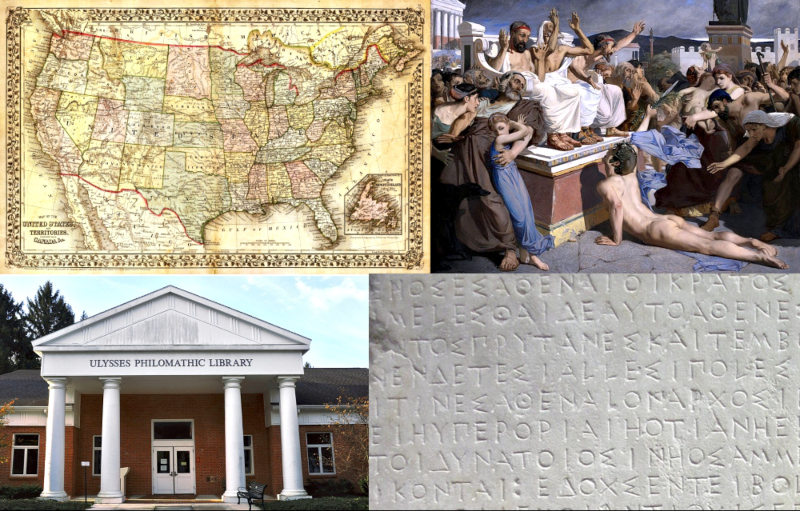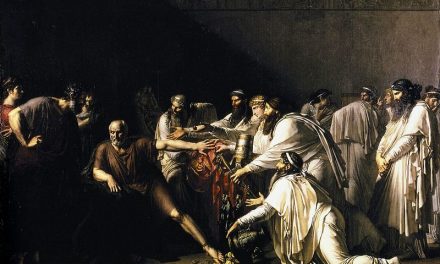There are many places worldwide bearing names of Greek origin, either because of their historical links to Greece -as in the case of cities founded as Greek colonies in the antiquity- or as a result of deliberate choice by philhellenes wishing to pay tribute to the spirit of Hellenism; we recently published an article featuring some examples of country names you probably didn’t know come from Greek, followed by another one on international city names of Greek origin.
There is probably no other country, outside of Greece and Cyprus, with quite as many place names of Greek origin as the United States of America. Given that, in the New World, many cities and towns were established in relatively recent times, the founders were free to choose a name of their preference; sometimes these names would be chosen by the authorities (as in the case of the Central New York Military Tract) and others by the citizens themselves, often through vote.
Especially after the American Revolution, Greek -and also Roman- names were very often chosen either because the cities’ founders were admirers of classical antiquity (a strong trend throughout the West in the 18th and 19th centuries), or to draw a direct connection between the new American republic and the values of the Roman Republic and, of course, Athenian democracy, as well as Greek philosophy and culture in general.
Below is an extensive, though not exhaustive, list of names of Greek origin given to cities, towns, villages and communities in the USA; some information about the names’ etymology and history is also provided, wherever possible. This is the second installment, featuring places from I through Z; you can find the rest of them in our previous feature, USA city names of Greek origin – Part 1.
Ilion
Ilion is a village in New York, named after the ancient city of Troy. “Ilion” (also known by its Latin variant, Ilium) was Troy’s alternate (and supposedly older) name. Its etymology is uncertain, although many modern archaeologists have suggested that it may be linked with a major city of the late Bronze Age mentioned in Hittite sources as Wilusa; this is also supported by metrical evidence in the Iliad that the name ᾽Ιλιον was formerly Ϝιλιον (Wilion) with a digamma.
According to Greek mythology, the name is owed to Ilus (Ilos), founder of the city, and son of Tros (see Troy, below). The Iliad‘s name means “poem of Ilion”, since it recounts the story of the city’s siege by the Greeks.
Ionia
There are around five cities and villages named Ionia in the USA, such as Ionia in Michigan; their name is -sometimes indirectly- owed to the ancient region on the western coast of Anatolia in present-day Turkey. The cities of Ionia are thought to have been founded by the Ionians, one of the four major tribes that the Ancient Greeks considered themselves to be divided into. The foundation myth which was current in the Classical period suggested that the Ionians were named after king Ion. The word for “Greek” in several languages (such as Yunan in Turkish, yunâni in Persian and yūnāniyy in Arabic) derives from Ion/Ionia.
Irene
A few cities and towns in the USA are called Irene, usually after women who were among the first settlers. The given name is the English version of irini, the word for “peace” in both Ancient and Modern Greek, which is also a female given name. One possible etymology is that it derives from the verb eiro “connect”.
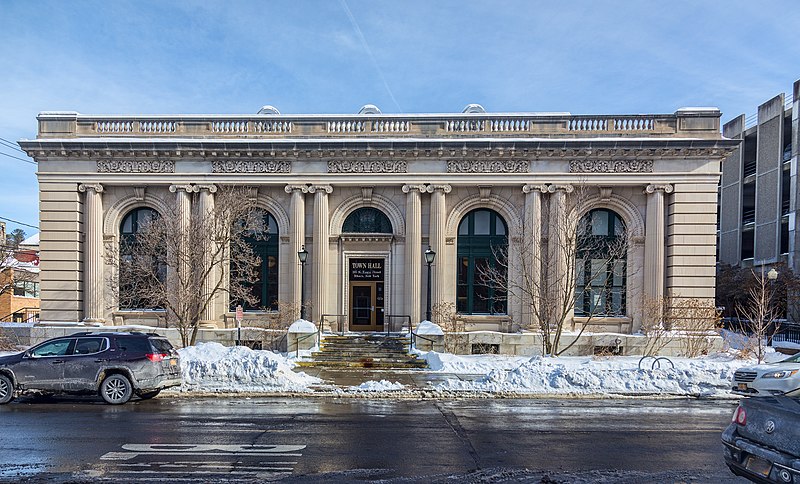 Ithaca Town Hall, New York (photo by Kenneth C. Zirkel, via Wikimedia Commons)
Ithaca Town Hall, New York (photo by Kenneth C. Zirkel, via Wikimedia Commons)
Ithaca
Ithaca is the name of six cities, towns and villages in the US, the largest one being in New York, after which the rest are also named. Ithaca NY is very close to the Town of Ulysses; it was named for the Greek island home of Ulysses in the spirit of the multitude of settlement names in the region. The island’s name is of uncertain etymology; some have argued it is of Pelasgian roots, and others that it derives from the same Phoenician root as the ancient city of Utica in Tunisia (after which Utica, New York is named).
Laconia
There are three places named Laconia in the USA, the largest one being a city in New Hampshire; they are named after the region of Laconia in the Peloponnese, where the city of Sparta is situated. The word is of uncertain origin, with one theory linking it to the word lakkos “pit”, owed to Laconia being a lowland region. The word “laconic” is derived from the name of the region as a reference to the ancient Spartans, who were renowned for their verbal austerity and blunt remarks.
Larissa
Larissa is a rural community and abandoned townsite in Texas; it was given that name after the eponymous Grecian city, thought to have been a center of learning. The original Larissa is still an important city, the fourth-most populous in Greece. Larissa is in origin a Pelasgian word for “fortress”. There were many ancient Greek cities with this name. The name of Thessalian Larissa is first recorded in connection with the aristocratic Aleuadai family.
Laurium
Laurium (also known as Lavrio), on the southeast coast of Attica, has been an area associated with mining since ancient times; an important extraction site for lead glance especially during the “Golden Age of Athens“, it once again flourished as a mining town in the 19th century, becoming Greece’s first company town. Fittingly, its namesake in Michigan, located in the center of the Copper Country -the first major copper mining region in the US- was founded as a company town serving the Laurium copper mine. The name Laurion in Greek comes from the word laura/laure meaning “alley, strait passage” and by extension “mine tunnel”.
Lepanto
Lepanto is a city in Arkansas named for the Greek seaport of Lepanto, on the coast of the Gulf of Corinth, site of a great sea battle between the Holy League and the Ottoman Empire in 1571. The city’s ancient name Naupaktos means “boatyard” (from naus “ship” and pêg- “to fix, fasten”). It was later Latinized as Naupactus and, by the late medieval period, corrupted to Nepahtos, Epaktos or Epahtos. By the Franks it was called Neopant, Nepant or Lepant. Being under Venetian control in the 15th century, it came to be known by the Venetian form of its name, Lepanto. Its original ancient name has been revived in Modern Greece.
Lysander
Lysander is a town in New York, named after a Spartan military leader who played a key role in the Peloponnesian League‘s victory in the Peloponnesian War, and Sparta’s domination over Greece for the following decade. The name Lysandros is a compound word, derived from the words lysis “release, unfastening” and andros, genitive of anēr “man”, meaning “liberator, he who releases (men)”.
Macedonia, Macedon
There are several towns and communities in various states directly or indirectly named after either the modern region of Macedonia in Greece or the ancient kingdom also known as Macedon (e.g. Macedonia, Iowa, Macedonia, Ohio and Macedon, New York). The Greek name Makedonía comes from the ethnonym Makedónes, itself derived from the ancient Greek adjective makednós, meaning “tall”, possibly descriptive of the people of the region. It has the same root as the adjective makros meaning “long” or “tall”. The name is believed to have originally meant either “highlanders”, “the tall ones”, or “high grown men”.
Marathon
There are seven cities, towns and communities in the USA called Marathon, e.g. in New York; they take their name from a Greek town that was the site of the battle of Marathon in 490 BCE, in which the heavily outnumbered Athenian army defeated the invading Persians. Its name comes from the herb fennel, called marathon in Ancient Greek, so Marathón literally means “fennel-field”.
The world’s most famous long-distance race is called a marathon after this place: the original event was instituted in commemoration of the Athenian soldier Pheidippides, a messenger who, according to legend, ran the distance from the battlefield to Athens to report the victory, collapsing and dying just after delivering the message.
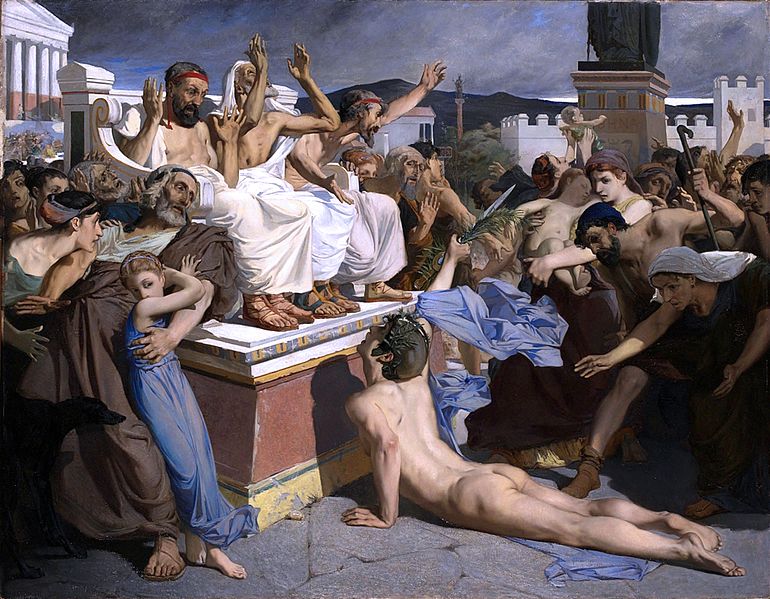 The Soldier of Marathon by Luc-Olivier Merson, 1869, oil on canvas, private collection (via Wikimedia Commons).
The Soldier of Marathon by Luc-Olivier Merson, 1869, oil on canvas, private collection (via Wikimedia Commons).
Mentor
There are several towns and communities in the USA bearing the name Mentor, the largest one being a city in Ohio named after the Greek figure Mentor, in keeping with the Connecticut Western Reserve settlers’ tradition; most of the other places are named after the Ohio city. In the Odyssey, Mentor was a man of great wisdom and friend of Odysseus (Ulysses), entrusted with the education of Odysseus’ son Telemachus; and the word “mentor” in English and other languages comes from him. His name derives from the Proto-Indo-European root men-, linked with the mind, the process of thinking and spiritual activities.
Naples
There are nine cities in the USA -the most famous of which in Florida– named after Italy’s third-largest city. Naples is the anglicized name of Napoli, which in turn is derived from its original Greek name, Neapolis meaning “new city”. You can read more about it in our feature on international Greek-named cities.
Ocean, Oceana
The word “ocean” comes from Oceanus (Okeanos in Greek), son of Uranus and Gaia, god of the primeval water, and source of all smaller waters, conceived as a great River which compasses the earth’s disc, returning into itself. The word’s etymology is uncertain, believed to be of Pre-Greek origin. There is a small town in Maryland called Ocean, several places -especially beach resorts- in various states called Ocean City, and a town in West Virginia called Oceana.
Odessa
There are several cities and towns called Odessa in the US -most notably Odessa, Texas– that have all taken their name from the eponymous city in Ukraine; that Odessa was in turn named after the ancient Greek city of Odessos, which was mistakenly believed to have been located there. You can read more about it in our feature on international Greek-named cities.
Olympia
The capital of Washington shares the name of one of Greece’s most iconic archaeological sites, where the ancient Olympic Games took place ; it is however named for the Olympic Mountains in Washington, that were in turn named after “Mount Olympus”, the mythical home of Greek Gods, in honor of the Greek explorer Juan de Fuca (Ioannis Phokas) who claimed to have found the fabled Northwest passage (the Strait of Anián, now known as the Strait of Juan de Fuca, between Vancouver Island and the Olympic Peninsula).
Orestes
Orestes is a town in Indiana, probably named after the Greek mythological figure made famous through various tragedies, especially Aeschylus’ trilogy, The Oresteia; his name is thought to mean “mountaineer, mountain dweller” from the ancient word oros “mountain”.
Panacea
The community of Panacea in Florida, home to five springs, was named after the goddess of universal remedy, because of the curative properties of the waters. In Greek mythology, Panacea was the daughter of Asclepius; her name –Panakeia in Greek- is formed from the prefix pan, combining form of pas “all, every” and the noun akos “remedy, cure”. Panakeia is the Greek word for “cure-all”.
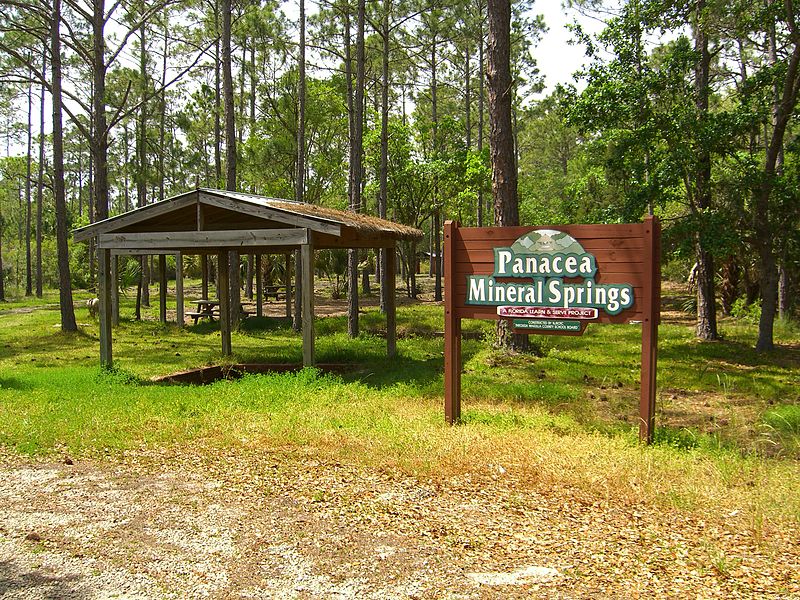 Panacea Mineral Springs at Panacea, Florida (photo by Steve Davis, via Wikimedia Commons).
Panacea Mineral Springs at Panacea, Florida (photo by Steve Davis, via Wikimedia Commons).
Pandora
There are a handful of communities with this name throughout the USA; in Greek mythology, Pandora was the first human woman created by Hephaestus on the instructions of Zeus. She is famous due to the myth of “Pandora’s box“, where the expression also comes from. The name derives from pan “all” and doron “gift”, thus meaning “the all-endowed”, “all-gifted”.
Panorama
The word panorama (a wide-angle view or representation of a physical space) is formed from pan “all” and orama “sight, view”; it was originally coined in the 18th century by the English painter Robert Barker. Panorama Village is a city in Texas.
Philadelphia
Philadelphia is famously called “the city of brotherly love”, its name deriving from the Ancient Greek verb philó “love” and the noun adelphós “brother”; it was chosen by Sir William Penn, the founder of the Province of Pennsylvania. Having experienced religious persecution as a Quaker, Penn wanted his colony to be a place where anyone could worship freely. This tolerance led to better relations with the local native tribes and fostered Philadelphia’s eminence.
There are five more cities or towns in the USA named after Pennsylvania’s largest city. The city of Amman (capital of present-day Jordan) was also named Philadelphia during its Greek and Roman periods, and was mentioned as the site of an early Christian congregation in the Book of Revelation.
Phoenix
Jack Swilling, a Confederate veteran of the Civil War, formed a small farmers’ community in Arizona in 1867. Lord Darrell Duppa, one of the original settlers in Swilling’s party, suggested the name Phoenix, as it described a city born from the ruins of a former civilization. The mythical bird phoenix is believed to be reborn from its own ashes; the word comes from Greek phoinix, which probably derives from the word phoinos, meaning “blood-red”. One of the earliest descriptions of the phoenix is found in Herodotus’ Histories, as a bird venerated by the Egyptians.
Plato
There is one city, two communities and a village in the USA named after one of the most famous philosophers of Ancient Greece. A disciple of Socrates, Plato was the founder of the Platonist school of thought, and the Academy, the first institution of higher learning in the Western world. His name –Platon in Greek- meant “broad-shouldered”, deriving from the adjective platys “broad”.
Salona
Salona is an unincorporated community in Pennsylvania, named after Thessalonica, also known as Saloniki or Salonica, Greece’s second-largest city and capital of the geographic region of Macedonia. The city was name Thessaloniki after princess Thessalonike of Macedon, the half-sister of Alexander the Great, whose name means “Thessalian victory”, from Thessalos and Nike “victory”, honoring the Macedonian victory at the Battle of Crocus Field (353/352 BCE).
Smyrna
Smyrna was a Greek city located on the Aegean coast of Anatolia in modern-day Turkey, nowadays called Izmir. It was a busy seaport and remained an important financial and cultural center of the Greek world until the early 20th century. A Greek myth derived the name from the eponymous Amazon, but according to a theory it comes from the ancient Greek word for myrrh, smýrna, which was the chief export of the city in ancient times.
There are about a dozen cities, towns and communities in the USA named after Smyrna; in particular, New Smyrna Beach in Florida was established as a colony by physician Dr. Andrew Turnbull in 1768, who named the settlement in honor of his wife, the daughter of a merchant from Smyrna, and also because, among the 1300 settlers he had recruited, around 500 or so came from Greece.
Solon
Solon was an Athenian statesman, lawmaker and poet, considered to be one of the “Seven Sages of Greece“, and credited with having laid the foundations for Athenian democracy. His name is of uncertain etymology, possibly deriving from solos “mass of iron”. There are four cities and towns in the USA directly or indirectly named after the Athenian lawmaker.
Sparta
Sparta was a prominent city-state, the dominant military land-power in ancient Greece, as well as the main rival of Athens and the leader of the Peloponnesian League in the Peloponnesian War. The modern-day city of Sparta lies at the site of the ancient one. Its name is of uncertain origin, with one theory linking it to spárton “rope, cable”, a reference to the cords laid as the city’s foundation boundaries. There are about seventeen cities, towns and communities in the USA directly or indirectly named after the Greek city-state. There is also a city in South Carolina named Spartanburg after a local militia in the American War of Independence, called the Spartan Regiment.
Syracuse
There are several cities and towns in the USA called Syracuse (e.g. in New York, Indiana and Utah. They are named after the classical Greek city Syracuse (Siracusa in Italian), on the eastern coast of the Italian island of Sicily. Syracuse was founded in 734 or 733 BC by Greek settlers from Corinth and Tenea, led by the oecist (colonizer) Archias as Syrakousai. A possible origin of the city’s name was given by Vibius Sequester citing first Stephanus Byzantius in that there was a Syracusian marsh called Syrako and secondly Marcian’s Periegesis wherein Archias gave the city the name of a nearby marsh.
Thermopolis
Thermopolis in Wyoming is a town with numerous natural hot springs, in which mineral-laden waters are heated by geothermal processes. Its name is owed to this fact, derived from the Greek word thermos “hot” and the suffix –polis “city, town”.
Tripoli
Tripoli is the name of a city in Iowa, as well as a community in Wisconsin, while there is another place called New Tripoli in Pennsylvania. In Greek, Tripoli(s) means “Three Cities”. There are various cities of that name in the former Hellenistic world, including the capital of the Peloponnese region in Greece, but the most famous one is the capital of Libya; you can read more about it in our feature on international Greek-named cities.
Troy
Troy is an ancient city in Anatolia, where the Trojan War is supposed to have taken place, as recorded in Homer’s epic poems. The etymology of its name is subject to debate; it is largely believed that it is linked to the historical name of the region of Troad, corresponding to the Biga Peninsula in modern-day Turkey. Troad is believed to get its name from the region’s Hittite name, Taruiša. According to Greek mythology, it was named after its founder, king Tros. There are over 30 cities, towns and communities in the USA named Troy, either directly after the eponymous legendary city or after its most famous namesake in New York, which boasts the motto Ilium fuit. Troja est “Ilium was, Troy is”.
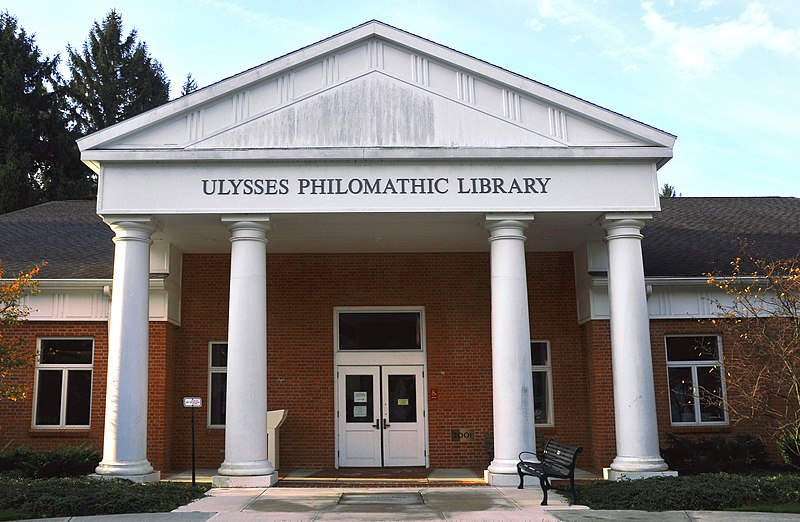 Public library in Ulysses, New York (photo by LBM1948, via Wikimedia Commons).
Public library in Ulysses, New York (photo by LBM1948, via Wikimedia Commons).
Ulysses
Ulysses is the Latinized version of Odysseus, a mythological hero known for his wit and cunning, whose famous journey of nostos-homecoming- from the Trojan War was immortalized by Homer in Odyssey. The Greek name Odysseus (also found in other forms, such as Olyseus or Olysseus) is of unknown etymology; ancient authors linked the name to the Greek verbs odussomai “to be wroth against, to hate”, oduromai “to lament, bewail” and ollumi “to perish, to be lost”, while it has also been suggested that it may be of non-Greek origin.
The Latin variant Ulysses was made famous by the American Civil War hero and eighteenth president of the United States, Ulysses S. Grant. It is this Ulysses that most of the namesake cities and villages are named after, with the exception of Ulysses, New York, named by Robert Harpur in 1790 for the hero of the Odyssey.
Urania
Urania is a town in Louisiana named after the Greek muse of astronomy; her name derived from the word ouranos meaning “sky, heaven”, which was also the name of the primal Greek god Uranus, after whom the planet Uranus is named.
Utopia
The term utopia was coined from Ancient Greek by Sir Thomas More for his 1516 book Utopia, describing a fictional island society in the Atlantic Ocean; it comes from the words ou “not” and topos “place” which translates as “no-place” and literally means any non-existent society, especially one perceived as an ideal one. There a few places with this name in the USA -some of which no longer exist as such- including an unincorporated community (and former anarchist settlement) in Ohio and a census-designated place in Texas.
Xenia
Xenia is a city in Ohio, after which some villages and communities in other states have also been named. Its name comes from the Greek word Xenia, the ancient Greek sacred rule of hospitality. It derives from xenos meaning “stranger, foreigner”. Xenios was one of Zeus’ epithets as the patron of hospitality and guests, avenger of wrongs done to strangers.
Ypsilanti, Michigan
The city of Ypsilanti in Michigan was originally a trading post established in 1809; a settlement was established in 1823 and later incorporated into the Territory of Michigan as Woodruff’s Grove. A separate nearby community was established in 1825 under the name “Ypsilanti”, after Demetrios Ypsilantis, a hero in the Greek War of Independence. Woodruff’s Grove changed its name to Ypsilanti in 1829, the year the eponymous Ypsilantis effectively won the war for the Greek Independence at the Battle of Petra, with the two communities eventually merging. A bust of Demetrios Ypsilantis by Greek sculptor Christopher Nastos stands between a Greek and a US flag at the base of the landmark Ypsilanti Water Tower. The Ypsilantis were a prominent family of Phanariotes, originally from Ypsili village in the Pontus region.
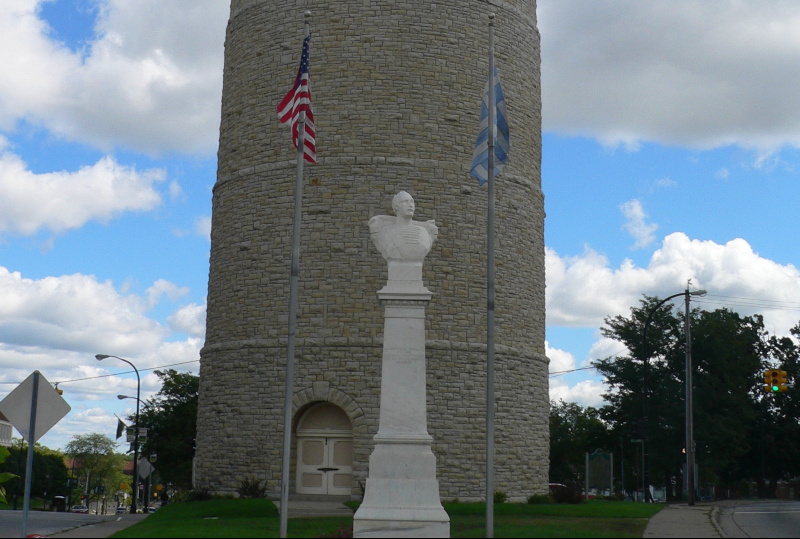 Bust of General Demetrios Ypsilantis in front of the Ypsilanti Water Tower (photo by Cmadler via Wikimedia Commons).
Bust of General Demetrios Ypsilantis in front of the Ypsilanti Water Tower (photo by Cmadler via Wikimedia Commons).
Zephyr, Zephyrhills
The town of Zephyr in Texas, and also the city Zephyrhills in Florida, are named after the light west wind known in Greek as zephyros; as all winds, it was personified as a Greek god (Zephyrus). The word probably derives from zofos “darkness”, to indicate its coming from the west, where the sun sets and light is lost.
Nefeli Mosaidi (Source: Wikipedia)
Read also via Greek News Agenda: USA city names of Greek origin – Part 1; International city names of Greek origin; Country names of Greek origin; Vassilis Papadopoulos on the lasting influence of the Greek language; Reading Greece: A.E. Stallings on Greek Mythology as a Source of Inspiration and the Greek Language as a Landscape in Poetry
TAGS: GREEK LANGUAGE | HISTORY

